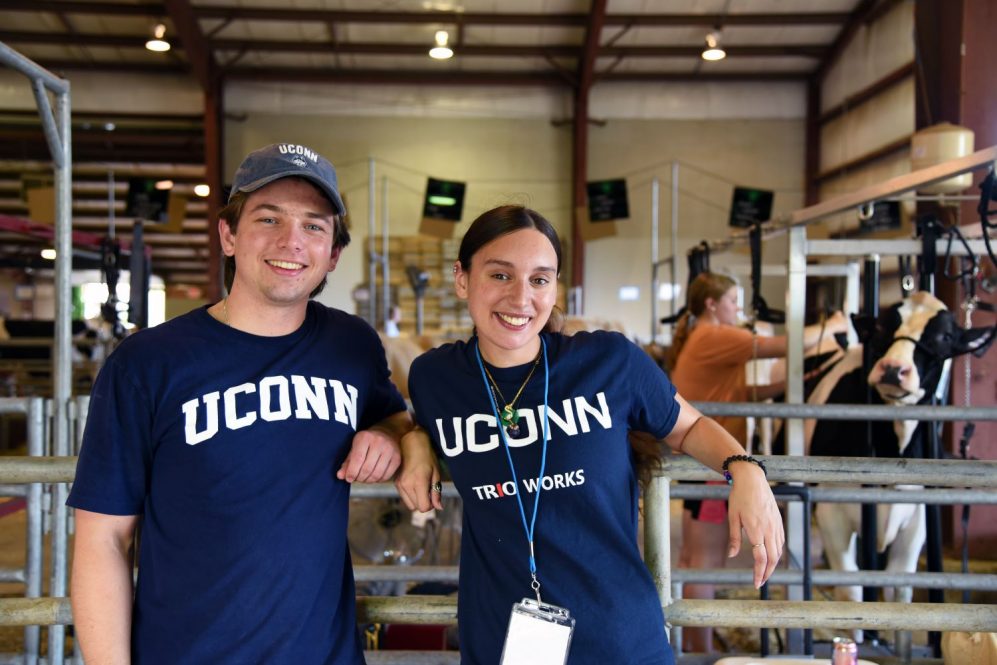Genesis Rosario ‘24 (CAHNR) had the chance to learn and practice a set of critical professional skills during her internship this summer with the UConn 4-H New Haven County program.
The internship has helped her craft her professional and interpersonal skills, something she says has been particularly valuable as a first-generation college student.
“This internship is really beneficial for me,” Rosario says.
One of Rosario’s chief responsibilities was to help publicize the fair, making flyers and other promotional materials. She also served as a communication judge to assess how well 4-H members presented their projects.
Rosario took advantage of the networking and professional development opportunities offered through the internship, working with other interns and extension educators.
“Everything’s a learning experience for me,” Rosario says.
Through this internship, Rosario, who is from Hartford and lives in New Britain, had the chance to interact with people who come from much more rural backgrounds. Rosario is majoring in allied health sciences and wants to work in public health after graduation. She says this experience will serve her well in the future as she works with diverse communities.
“I want to be part of 4-H for years to come because it brings out the human part, and I love seeing people connect,” Rosario says.
Rosario joined veteran UConn 4-H interns like Cade Bucheit ‘23, majoring in social work. Buckheit interned with the program last year as well, and says he loves being part of an organization that helps youth thrive at a time when it is needed most.
“My time with 4-H so far has been extremely valuable to me because of the amazing people I have met, and the incredible things they have taught me,” says Buckheit. “One of my goals for the summer was to spread the word about 4-H right near where I live in Middlesex County.”
The Middlesex and New Haven County 4-H fair, held the first weekend in August, showcased projects from cattle to quilts at the Durham Fairgrounds. The Middlesex County fair is the oldest 4-H fair in the state, approaching its hundredth anniversary in 2024. It merged with the New Haven County Fair 30 years ago.
This is the first in-person fair since the onset of the COVID-19 pandemic.
“It’s exciting for all of us who had to be virtual for a year and a half,” UConn 4-H youth development associate extension educator Margaret “Peggy” Grillo says. “The kids are excited, as are the adults.”
Unlike 4-H fairs in other states, Connecticut 4-H fairs are organized entirely by the 4-H members, rather than adult volunteers, and are not attached to local fairs run by municipal governments. This provides members with real-world leadership and decision-making experience.
At the fair, UConn 4-H members showed animals including cattle, horses, goats, rabbits, and sheep. Due to the current avian influenza spread, there were no live poultry at the fair this year. Other 4-H members displayed home arts projects including quilts, sewing projects, drawings, photography, gardening, and baked goods. The fair also featured horse, oxen, truck, and tractor pulls.
4-H fairs are where youth participants present their STEM-related projects for evaluation by experienced professionals. Animals projects incorporate genetics and nutrition, while home arts help K-12 members integrate technology and math in a fun and engaging manner. For instance, the 4-H Robotics Clubs brought a robot to demonstrate and allowed the public to try their hand at operating the machines.
Projects won prizes in various categories throughout the fair and everyone who presented received feedback from judges.
“It’s a lot of work and it’s an educational experience,” says Grillo. “But the most important thing is, you’ve got to have fun.”
UConn 4-H is the youth development program of UConn Extension with the College of Agriculture, Health and Natural Resources (CAHNR). As part of the University of Connecticut, 4-H has access to research-based, age-appropriate information needed to help youth reach their full potential. The mission of 4-H is to assist all youth ages 5-18 in acquiring knowledge, developing leadership and life skills while forming attitudes that will enable them to become self-directing, productive and contributing members of their families and communities. Visit the UConn 4-H site for more information.
Follow UConn CAHNR on social media



